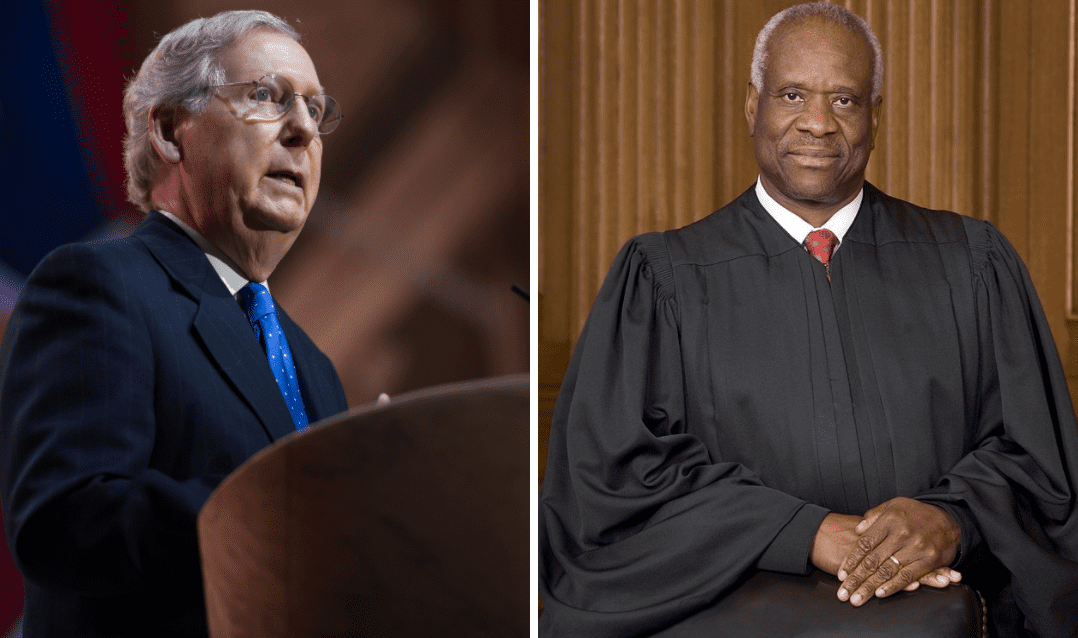Quite a Day in the Right Turn Against Corporate America

Two events came to pass Monday that, for now, have gained only the attention of specialists. That is, legal eagles, aggrieved conservative activists, and hardline devotees of the status quo.
But here’s putting forward that these developments have the potential to soon be viewed as watersheds in tandem.
First, Senate Minority Leader Mitch McConnell, whose political status has taken a hit in recent months—having failed to persuade former President Trump to concede the election, having failed to maintain a peace with his party’s standard-bearer, and then having helped forfeit the Republicans’ Senate majority in Georgia with dubious, corporate-friendly candidates—affirmed a new reality on Monday. The Kentuckian confirmed what seems an increasingly uni-party mindset in America’s major corporations, decrying “a coordinated campaign by powerful and wealthy people to mislead.”
What McConnell really did here is affirm his party’s future, indeed likely its only real chance of survival: a path forward predicated on going to war with big business. It’s no doubt an astonishing reversal for a figure who came into politics as a Reaganite, first elected to the Senate in the early 1980’s.
But McConnell is nothing, if not a survivor.
“From election law to environmentalism to radical social agendas to the Second Amendment, parts of the private sector keep dabbling in behaving like a woke parallel government,” McConnell proclaimed in a release. As much prophecy as legislative threat, McConnell said: “Corporations will invite serious consequences if they become a vehicle for far-left mobs to hijack our country from outside the constitutional order.” The minority leader argued that “Americans do not need or want big business to amplify disinformation or react to every manufactured controversy.” And the Bluegrass Stater bemoaned that it is “jaw-dropping to see powerful American institutions not just permit themselves to be bullied, but join in the bullying themselves.”
The backdrop to all this, or the final straw, was of course the decision of Major League Baseball, “America’s pastime” to heave-ho its all-star game from Atlanta following a controversial voting rules overhaul in Republican-governed Georgia.
Quite dubiously decried by the White House as a “new Jim Crow,” McConnell for his part smacked down that characterization by noting that “wealthy corporations have no problem operating in New York, for example, which has fewer days of early voting than Georgia, requires excuses for absentee ballots, and restricts electioneering via refreshments.” He made the case that “there is no consistent or factual standard being applied here.”
Next, Supreme Court Justice Clarence Thomas on Monday secured his place as the sweetheart of conservative reformers, and even some left-wing critics of big technology firms. In an expressive dissent in a basically moot case over former President Donald Trump’s (defunct) Twitter account, Thomas wrote: “If part of the problem is private, concentrated control over online content and platforms available to the public, then part of the solution may be found in doctrines that limit the right of a private company to exclude.”
The proliferation of trap doors on social media in recent years has suited the c-suite well (though some leaders, such as Twitter’s Jack Dorsey, have expressed squeamishness with this level of essentially unilateral authority). And it has, of course, been manna from heaven for the dispositionally censorious. To say Republicans and traditional civil libertarians have been up in arms on the matter would to disqualifyingly understate the case.
Big Tech censorship, perhaps only vindicated by the 2020 triumph of “woke” politics, has become the issue for many.
And Justice Thomas just threw dissidents a huge bone. “This Court long ago suggested that regulations like those placed on common concurring carriers may be justified, even for industries not historically recognized as common carriers, when ‘a business, by circumstances and its nature, . . . rise[s] from private to be of public concern,’” said Thomas.
Biden may bore, but the emerging battle lines of his America most certainly do not.